[ad_1]
Teaching grammar can be loads of fun! There are so many active, hands-on ways to engage your learners while at the same time reinforcing important concepts. Here are a few of our favorite grammar games to play with your elementary students.
1. Conjunctive Adverb Ball Toss
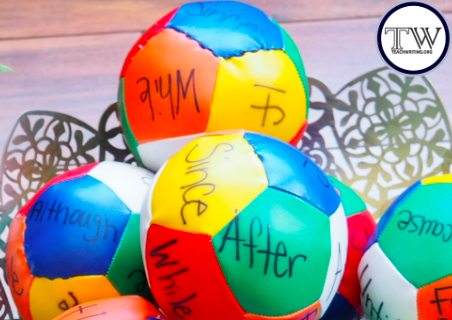
To play the game, one student will toss this conjunctive adverb ball to another student in the group. The person who catches the ball will create a compound sentence using the conjunctive adverb closest to their thumb. The person who tossed the ball will write down the sentence using the appropriate punctuation. The game continues until one group has created and written 20 sentences on their worksheet. The first group to have 20 correctly written sentences wins.
Learn more: Teaching Writing
2. Grammar Headbands
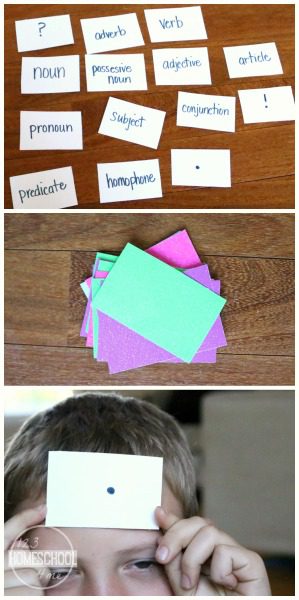
This game will help kids learn to differentiate between the different parts of speech. Without looking, one student will place a word card on their forehead so that their partner can see the word on the card. That student’s job is to describe the word on the card without saying the actual word.
Learn more: 123Homeschool4Me
3. Mystery Word Game
Students play in groups of three and take turns trying to guess the “mystery word” on the card. A few clues are given for each word (whether it is a noun, an adjective, or a verb, how many letters it has, what it starts or ends with, etc.). One student reads while the other students guess. Comes with 50 mystery cards for less than $2.
Learn more: The Teaching Rabbit
4. Roll a Word Vocabulary Practice
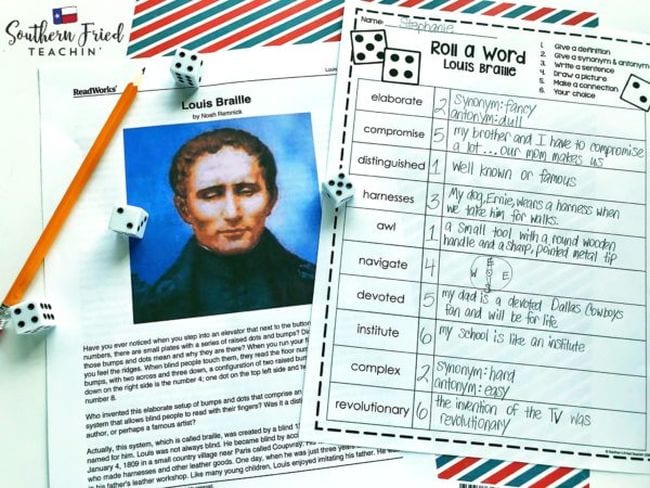
Dice games help spice up vocabulary practice, something many kids find dull. Set a list of words, then give each kid a die to roll. Based on the number, they do one of the following activities as seen on the worksheet above.
Learn More: Southern Fried Teachin’
5. Roll a Sentence
If you’re looking for grammar games to give students practice with punctuation, try Roll a Sentence. Students roll the dice to get words that they must then use to complete a sentence with correct grammar and punctuation. The words are divided into five categories: person/thing, adjective, preposition, verb, place. Each category has 11 possible words, numbered from 2 to 12. Students roll once for each column and write down the word they scored. After they have rolled five times, they must put all the words together to form a logical sentence.
Learn more: Busy Teacher
6. Contraction Bingo
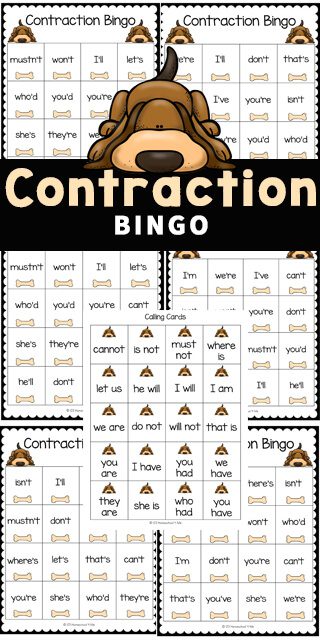
This version of Bingo puts a fun twist on learning contractions. Each child receives a Bingo board with contractions on it. The caller calls out the expanded version of the word and the students have to figure out if the contraction is on their board.
Learn more: 123Homeschool4Me
7. Funny Flips
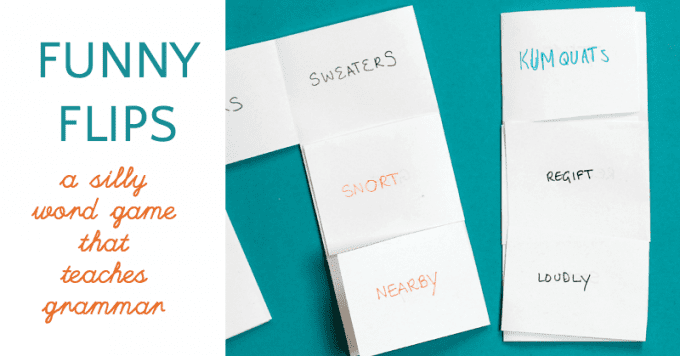
If you’re looking for wordplay grammar games, this silly game is for you. The object is to mix and match words to make simple—and ridiculous—sentences, all the while learning grammar skills, especially the tricky concept of adverbs.
Learn more: What Do We Do All Day?
8. Grandmother’s Cat
This fun ABC game helps kids practice identifying adjectives. The first player completes the sentence “My grandmother’s cat is _____,” using a word that begins with A. The next player repeats the sentence with a word that begins with B, and so on. A variation on this game would be to use the sentence “My grandmother’s cat likes to _____,” with students filling in the blank with verbs.
Learn more: Your Dictionary
9. Parts-of-Speech Bingo
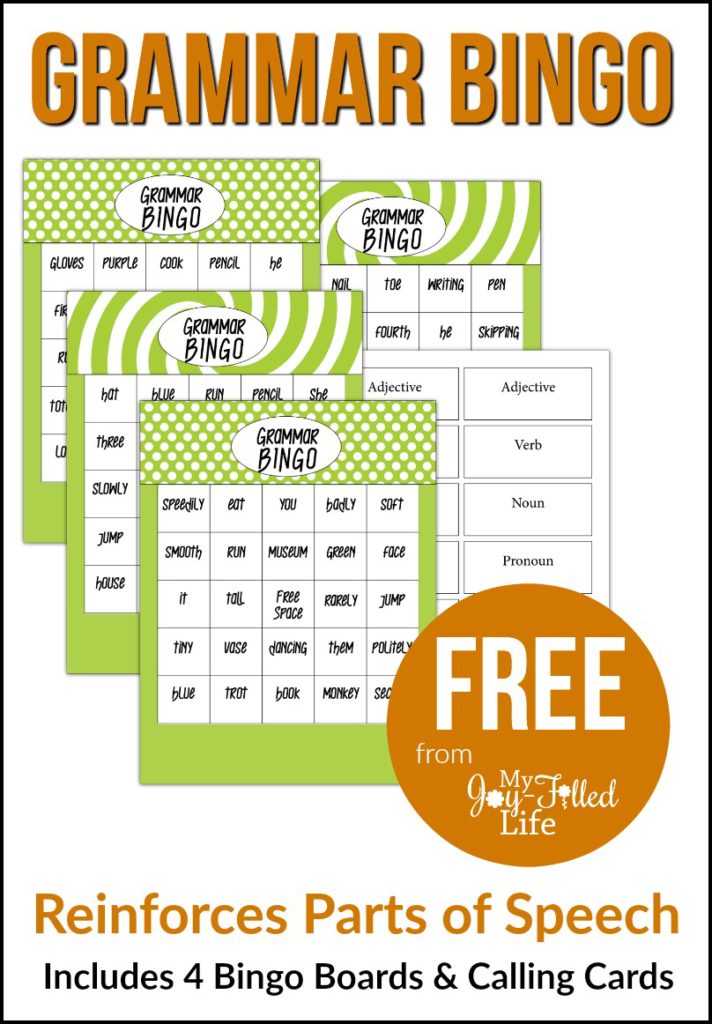
Grammar games are a great way to teach parts of speech. This free downloadable gives you everything you need for another fun version of Bingo. Each card is populated with words that are different parts of speech. The caller calls out a part of speech, for instance “verb,” and the student must find a verb on their card and place a marker there. The game continues in regular Bingo fashion.
Learn more: My Joy-Filled Life
10. Peculiar Paragraph
Divide students into groups of 10, then have each student write a sentence on absolutely any subject. The object of the game is for the group to then arrange all of the sentences together into a “peculiar” paragraph. They’ll need to add conjunctions to help the sentences flow cohesively, but they may not add any other pieces of information. When each group is finished, let them read their paragraph aloud.
Learn more: Bright Hub Education
11. Simple Sentence Smackdown
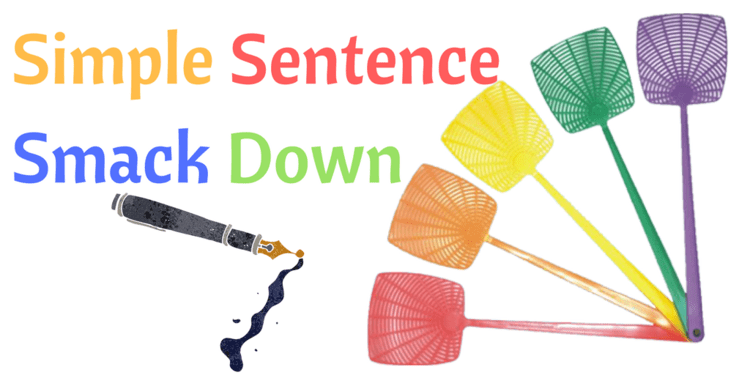
For this active game, you will need two plastic flyswatters. On a piece of chart paper or on a large white board, write 15 examples of complete sentences and 15 examples of sentence fragments. Divide your class into two lines and for each twosome, call out “simple sentence” or “fragment sentence.” The first player to smack a correct example earns a point for their team. Play continues until everyone has a chance to play.
Learn more: Teaching Writing
12. Grammar Simon Says
Incorporating actions and movement into learning helps kids conceptualize. Before you play this version of Simon Says, establish certain motions for different parts of speech. For example, if you hear a noun, touch your shoes. If you hear a verb, run in place, etc. Let the kids practice a few times, then start calling out actual nouns, verbs, adjectives, etc. If the student makes the right motion, they stay in the game. If not, they take a seat.
Learn more: Reading Eggs
13. Write and Draw
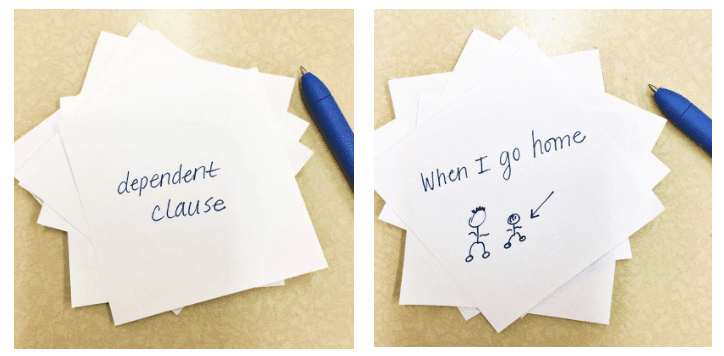
This game is a lot like the board game Telestrations. Start with a stack of index cards. The first player will write a grammar concept on the top card then pass the stack to the next player. That player reads the card, puts it on the bottom of the stack, then draws a picture of the concept on their card. They pass it to the next player, who must try to identify the concept, write that word, and pass to the next player, etc. At the end, start with the first card and read through the sequence of cards to see how clearly the concept was communicated, or how convoluted it became.
Learn more: Reading and Writing Haven (Telephone Grammar)
14. Noun Scavenger Hunt
This fun game gives young learners a hands-on way to learn about nouns. Once your students understand the concept of nouns = person-place-thing, set a timer. Then challenge your students to go on a classroom scavenger hunt for nouns that start with each letter of the alphabet. Provide them with a lined worksheet with each letter of the alphabet in the left column and room to write their words on the right.
15. Synonym Scramble
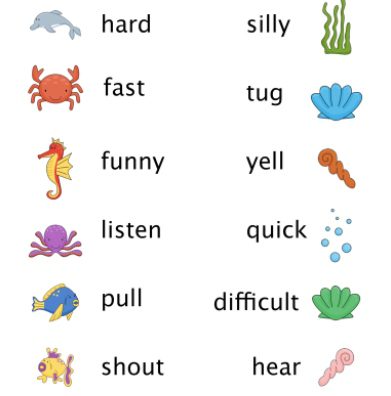
This is a fun small-group card game. Prepare a list of synonym word pairs that are appropriate for your grade level. Next, prepare a deck of index cards. Write one word in blue on one side and the word’s synonym in red on the other. Pass out one card to each student, blue side up. Then, read a word from the red column while the students figure out who has that card. Repeat until all of the cards are claimed.
Learn more: Education World
If you like these grammar games, check out 20 Meaningful Vocabulary Activities for Every Grade.
Plus, find out how other teachers tackle grammar practice on the WeAreTeachers HELPLINE group on Facebook!
[ad_2]
Source link


More Stories
Transforming Appearances with the Perfect Hairpiece Touch
Exploring the Wonders of Modern Sciences
How Sciences Unlock the Mysteries of the Universe